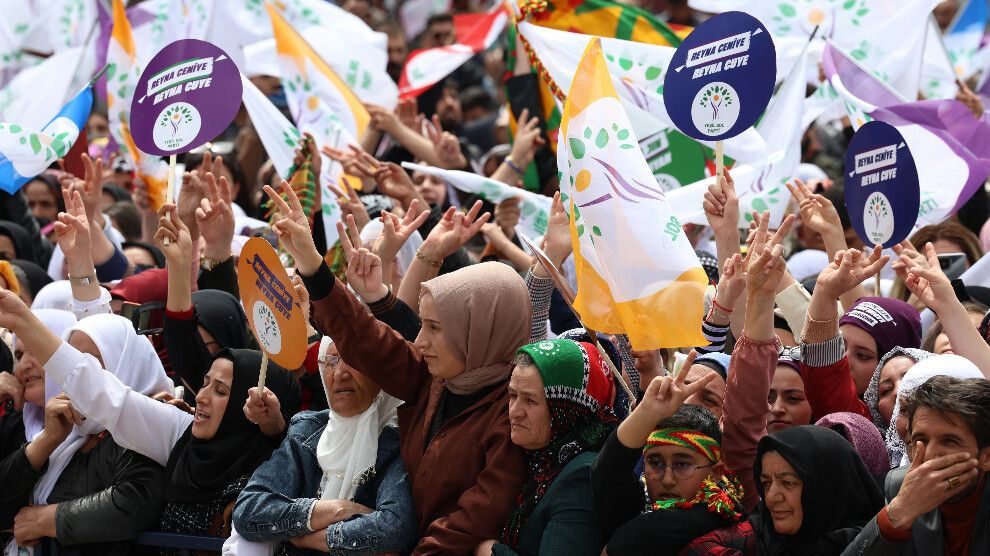Women organise themselves autonomously within Kurdistan Liberation Movement. What is behind it and how does it work? Çiğdem Doğu (KJK) explains the ideological and structural approach of the Kurdish women’s liberation movement.
Çiğdem Doğu, a coordinating member of the KJK (Kurdistan Women’s Community), spoke in a programme on Jin TV about the “organising” aspect of Kurdish women’s liberation ideology. We are publishing excerpts from the interview in English translation.
Organising is a basic principle of women’s liberation ideology. It is the same for all ideologies. It is not possible to take a step without organisation. The history of humanity is in a way the history of organisation. Socialisation, the emergence of a society, is an expression of organisation based on ethical principles. Organisation has a strategic importance for the future of the human, of society and of humanity. Conceptually, it means the weaving of society. One weaves the reality, the economy, the health, the life and the education of society. In Kurdish we say rêxistin. It means to take or correct a path. If we look at the etymology, we can see what it means for humanity.
The pioneer of the first organisation and socialisation was the woman. Because she played a pioneering role in the organisation of social life and rendered valuable services to society in this sense, she was elevated to the rank of goddess. But then, although she was a pioneering force, she was condemned to complete disorganisation. Today we speak of the weakening of women’s willpower, of oppression, violence and rape. And why? Because they are disorganised, defenceless and weak. In a sense, organisation is self-defence, the shaping and organisation of one’s own life.
Organising means coming together for a purpose, to achieve a goal. Women were disconnected from this form of coming together. This is the point at which isolation emerged. As women have become isolated and disorganised, their connections with each other and with life and society have been severed. Women are confined to the domestic sphere. Their thoughts, minds, feelings and interpersonal relationships shrink and they become defenceless. The more defenceless they become, the more the man takes over.
That is why organisation is a basic principle of women’s liberation. For how can a woman have a will without organisation? How can she be liberated if she is left alone, if she has no willpower? Without organisation, there can be no freedom. Capitalist modernity has produced a type of woman by giving individual women leadership status. There are top female politicians in state systems, there are also female artists and academics. Of course there are very valuable people among them. But they are individuals.
So is it fair to say that liberalism is trying to break up the organisation?
In a way. Because the women’s struggle is getting stronger and stronger. The development of capitalist modernity has created a great environment for women to organise. Feminism emerged in this environment. There were women’s movements before, but it created a more organised environment. This led to the enlightenment and awareness of women. At this point, the male-dominated mind considered how it could thwart this organisation. Women came to the fore as individuals, not as organised women. All women are condemned to this.
Let me give you an example. Last year there was a NATO summit. The women, ministers, and prime ministers of the NATO countries took a photo and said: “NATO is us.” These are women who also call themselves feminists, which is not true. We see that there is no women’s organisation there anyway. It’s women speaking out who are part of the male-dominated system. There is no organisation, there are individuals. Who is NATO? NATO is a special war organisation against women and peoples. It is an organisation in which nation states come together and make a common policy.
You can see very clearly what the reality of unorganised women means here. Unorganised women are helpless in society when it comes to expressing their thoughts, developing themselves, speaking out, forming relationships on a broad scale and protecting their economy, health and education and themselves. The greater the disorganisation, the greater the fatalism. The more isolated a woman is, the weaker she is against the system. As long as she remains weak, she cannot change the fate imposed on her. So how can fate be changed? It will change through organisation.
The women’s movement speaks of specific and autonomous organisation. Could you explain this in more detail? You also talk about the “third way” model. What exactly is the third way?
Organisation is important and strategic. But just as important is the question of how to organise. There are thousands of women’s organisations around the world. Organising alone is not enough. How we organise is important. What form of organising can overcome and set back the system of male domination? In terms of our organising experiences, we can say the following: We have developed as a PKK movement. Rêber Apo said: “The women in the PKK organise themselves specifically and autonomously.” That was a very important statement.
There have been feminist movements that consisted of women and focused only on women. But these movements live themselves in a social context that needs to be changed. The social reality must be changed. It is necessary to change men, to liberate all areas, starting with children. It can’t just be about women. Let’s liberate only women, for example. But what about the male reality? They will probably not be physically eradicated. Men also exist in this life. While we are trying to liberate women, we also need to change men, society and traditions. Feminism is often equated with women’s struggle. We also rely on women, but we see the struggle for social change as a strategy. Feminism leaves society out of the equation.
Does it harm the organisation of women that feminism is so fragmented?
There should always be diversity, that means richness. But the differences should also be able to unite in one pool. There are many feminist movements. They are somehow fighting for women’s freedom and equality, but they are fragmented. This is the most important problem in our struggle. There is no common pool where they complement each other and develop a common strategy. This divides the strength of women.
There have been anarchist and socialist movements that have fought for the freedom of society and have always had a very important women’s potential. Let’s look at all the socialist struggles: Women played a very important pioneering role and took an active part. But what was the organisational strategy here? There was a general (mixed-gender) party organisation in which women were supposed to participate. The motto was: “If we liberate society, women will also be liberated.”
Feminism on the one hand completely isolates women from society, while the other side says that we should liberate society and afterwards we will liberate women. These are two very contradictory approaches. Has the liberation of women crystallised in any of these fighting movements? There is seventy years of Soviet experience and experience from various revolutions. We see in all of them that women’s freedom was not guaranteed. At some point, the classic traditional male-female policy continued. We say that neither of them can work in this form. But there is a third approach to the organisation of women. This third line means: we will fight together with society. We will be in society.
In our movement we call this “general”. In the PKK movement we act together with our male comrades. But as a women’s movement we have a specific and autonomous organisation. For example, there is the PAJK. As a women’s party, we carry out our struggle together with the PKK. We have not separated ourselves from it, but we make our own decisions regarding women. The women’s movement discusses and decides on the distribution of tasks. The women themselves decide how to deal with current developments and what women’s policy should look like.
In general, let’s say the developments in the Middle East, the hostile politics, the reality of war – if the women’s movement has an opinion and assessment in this direction, it discusses it with the general organisation. It is not the opinion of Heval Çiğdem or any other person. It is the assessment of the women’s organisation, because we have discussed, assessed, decided, and planned together. That is why we have a specific and autonomous women’s organisation within the movement. The more a woman is organised within a community, the stronger she is, because she fights out of a common will. We are fundamentally fighting against the male system of domination and are also waging a gender struggle within the movement. This also applies to the YJA Star women’s army. We talk about the HPG guerrilla, but within this guerrilla army there is also the YJA Star, which organises itself specifically and autonomously as an association of free women.

